The Third Trimester Checklist: Preparing for Your Baby
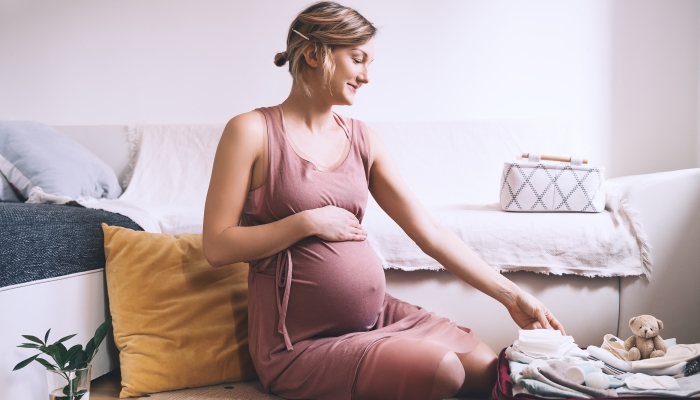
- The third trimester starts at week 27 of pregnancy and ends with the delivery of your baby.
- Start preparing your home for your new baby during your third trimester.
- The third trimester is a good time to pack a hospital bag.
- During the last few weeks of pregnancy, make sure you work out logistics with health insurance and pre-register at the hospital.
- Work out maternity leave with your employer as soon as you can before your baby arrives.
The third trimester of pregnancy starts at week 27 of pregnancy and ends when your baby arrives. The third trimester is an exciting time for new parents, but it can feel a little overwhelming too. Pregnant mamas often start feeling uncomfortable and tired in the third trimester. As their due date gets closer, they may worry about being ready for the big day.
As you prepare for your baby’s arrival, you can use a pregnancy checklist to stay organized and feel confident heading into your final weeks of pregnancy.
Here are some of the most important parts of the third trimester checklist: preparing for your baby, packing your hospital bag, and making a birth plan.
To help keep yourself from getting overwhelmed, remember to work on just one thing at a time, ask for help from your support system, and get plenty of rest.
How Can You Prepare for Your Third Trimester?
The best things you can do to prepare for the third trimester are to ask for help from your loved ones and make sure you are taking good care of yourself.
Throughout your pregnancy, it’s also important to try to eat healthy foods, get some exercise, and get enough rest.
You can start making your third trimester checklist during your second trimester. Keep in mind that you may feel more tired during your third trimester of pregnancy, so starting early is a good idea.
What to Consider When Making a Third Trimester Checklist
Remember that every pregnancy is different, and every family has different needs and goals for their lifestyle. When making your third trimester checklist, there are a few things you should keep in mind:
- Budget. You may have to eliminate some unnecessary baby items.
- Time. First-time moms often over-schedule themselves. Be realistic about how much time you will spend caring for yourself and your new baby
- Assistance. Think about people in your community that can help you during your third trimester and after you deliver. Family, friends, and a support group are invaluable in the first few weeks after you have your baby.
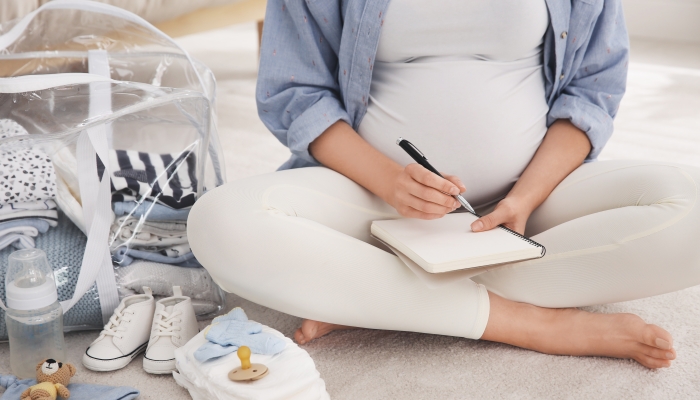
Necessary Things In Your Third Trimester Checklist
While no pregnancy and delivery are exactly alike, there are a few things that you absolutely need to include in your third trimester checklist.
Prepare Your Essential Baby Gear
The number one thing on your pregnancy checklist should be to prepare any necessities for your baby. Despite the shelves of things you can find at a baby store, the list of things you actually need is quite short. Make sure you have clean clothing, a few blankets, a place for your baby to sleep, a car seat, a breast pump, and bottles.
Assemble baby gear like swings or a crib long before your due date.
Pack a Hospital Bag
While you don’t need a lot, make sure that you have packed your hospital bag with a few essentials. Your hospital bags should have a few snacks, a set of maternity clothes for you and an outfit for your baby, and any comfort items you would like to have with you. The hospital can provide you with other essentials like toothbrushes, disposable underwear, and medications.
Finish Baby Proofing Your Living Space
While your baby won’t be opening drawers or crawling for the stairs for a few months, it is easier to baby proof your home before you have a small child to take care of. Make sure you move hazardous chemicals out of reach, put locks on low cabinets and drawers, and cover all electrical outlets in your home.
Install Your Baby’s Car Seat
All infants must have a car seat before they can go home with their parents. Hospital staff will even come out to your car with you to ensure that the car seat is the correct size and is properly installed before you leave the hospital.
Infants should always be placed in a rear-facing infant car seat. Used car seats are not recommended. WIC programs can help you get a safe car seat for free or for a discount if you need help.
Attend Your Final Doctors Appointments
Towards the end of your pregnancy, you are probably tired of going to the doctor. However, it’s important not to skip any of your doctors appointments in your second trimester or third trimester.
During your final appointments, your doctor will make sure that you and your baby are growing at a healthy rate, and will monitor for serious complications like intrauterine growth restriction, preeclampsia, and placenta previa.
Confirm Plans for Maternity Leave
Make sure you are clear about your maternity leave with your employer, and get things figured out as soon as you can. Most companies require a physician to sign paperwork before they will approve your maternity leave. Getting paperwork in order can take several weeks, and isn’t something you’ll want to be dealing with after you deliver your baby.
Coordinate With Your Insurance Company
Make sure you talk with your insurance company about coverage, deductibles, and emergencies while you are in your third trimester. Make sure that your selected healthcare provider and hospital are covered under your insurance plan.
Decide On Childcare Plans
Whether or not you choose to work after having your baby, you will want to think about childcare plans before your baby arrives. Discuss with your partner if you would like help from other family members, who you feel comfortable with watching your child, and if you will use a daycare or nanny to help with your childcare needs.
If you have older children at home, make a plan for who can take care of them while you are in the hospital.
Talk About Vaccinations
Vaccinations are a hot topic in many parenting groups. Talk to your pediatrician about vaccine schedules for your newborn, and write down any questions you have so you don’t forget. The CDC also recommends that any adults that will be in contact with your baby should have their whooping cough and flu vaccines at least two weeks before they visit.
It’s safe and recommended that pregnant mothers receive their Tdap and flu vaccines before their baby’s arrival.
Make a Birth Plan
Your birth plan can be as simple or as specific as you would like it to be, but you should at least have a few things decided before your baby arrives. Before your due date, make sure you have thought about who you want to have in the delivery room with you, whether or not you would like an epidural right away, and whether you want to try breastfeeding right after you deliver.
You should also make sure you have thought about surprises and have backup plans for things like early labor or emergency C-section delivery.
Get a Breast Pump
Thanks to the Affordable Care Act, all mothers can get a breast pump and breast pump parts through their insurance company. If you do not have health insurance, you may be able to qualify for one through WIC. You will also need bags or bottles to store your pumped breast milk.
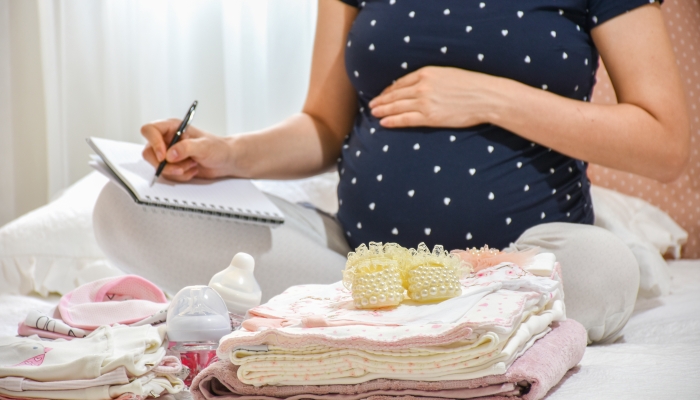
Additional Things You May Include in Your Third Trimester Checklist
While these things are not essential, they can make your third trimester more enjoyable, and help you make a smooth transition into parenthood:
Have a Baby Shower
A baby shower is a fun way to celebrate your new baby with friends and family. You might choose to throw a huge party with balloon sculptures and party games or have a small get together with only your closest loved ones. Either way, it’s a fun way to let the people around you pamper you for a few hours and show how much they love you and your growing baby.
Bring Other Children to A Sibling Class
Some older siblings may have a hard time adjusting after you bring your new baby home. Many hospitals offer sibling classes to help you and your other children adjust to having another little person around.
Decorate Your Baby’s Nursery
There is no such thing as one perfect nursery. All a baby really needs is a safe place to sleep. According to the American Academy of Pediatrics, all you really need is a crib with a firm mattress for your baby to sleep on.
However, many new parents have a lot of fun decorating their new baby’s nursery. It can feel good to create a space that’s just for your little one to come home to.
See a Lactation Consultant
If you plan to breastfeed, it can be helpful to see a lactation consultant before you deliver your baby. The early days of breastfeeding can be difficult for some mothers, and a lactation consultant can help you prepare and know what to expect. They may also be able to give you some tips and tricks to have a stress-free breastfeeding experience.
Take a Hospital Tour
While not required, it may ease your mind to take a hospital tour before giving birth to your baby. Most hospitals will allow you to schedule an appointment to see the delivery room and recovery rooms, find out about visitor rules, see the nursery, and answer any questions you have about their hospital.
What to Avoid During Your Third Trimester
John Hopkins Medicine recommends eating healthy foods, getting exercise, and taking a prenatal vitamin throughout your entire pregnancy. While these recommendations remain the same during the third trimester, there are a few other things you need to be mindful of as you enter the home stretch of your pregnancy.
Stress
It’s easy to get stressed during the last weeks of your pregnancy. Preparing for a newborn can feel scary and overwhelming, especially for a first time mom.
Try to get as much rest as you can, ask for help when you need it, and talk to other mamas about what they did to feel more confident about bringing home a new baby.
Long Travel
Long road trips and flying may be unsafe during your third trimester. Talk to your healthcare provider about any travel plans you have as you get closer to your due date.
Sleeping on Your Back
Sleeping flat on your back can pinch large blood vessels in your body, making it difficult to get oxygen-rich blood to your baby and your own brain. Doctors like the ones at Ohio State University recommend that pregnant mothers sleep on their left side starting around 20 weeks of pregnancy.
FAQs
How does the third trimester of pregnancy affect the mother?
Mothers in their third trimester often feel more tired and have a harder time getting around. Some mothers may start to feel more joint pain or have swollen legs or feet during their third trimester.
Is it okay to rest a lot in the third trimester of pregnancy?
It’s important that mothers in their third trimester follow their doctors recommendations about rest and activity. It’s normal to need extra rest during the final few weeks of pregnancy.
Can I still exercise during the third trimester of pregnancy?
As long as you do not have any pregnancy complications, you should be able to do some light exercise during the third trimester of pregnancy. Talk to your healthcare provider about your own limitations.
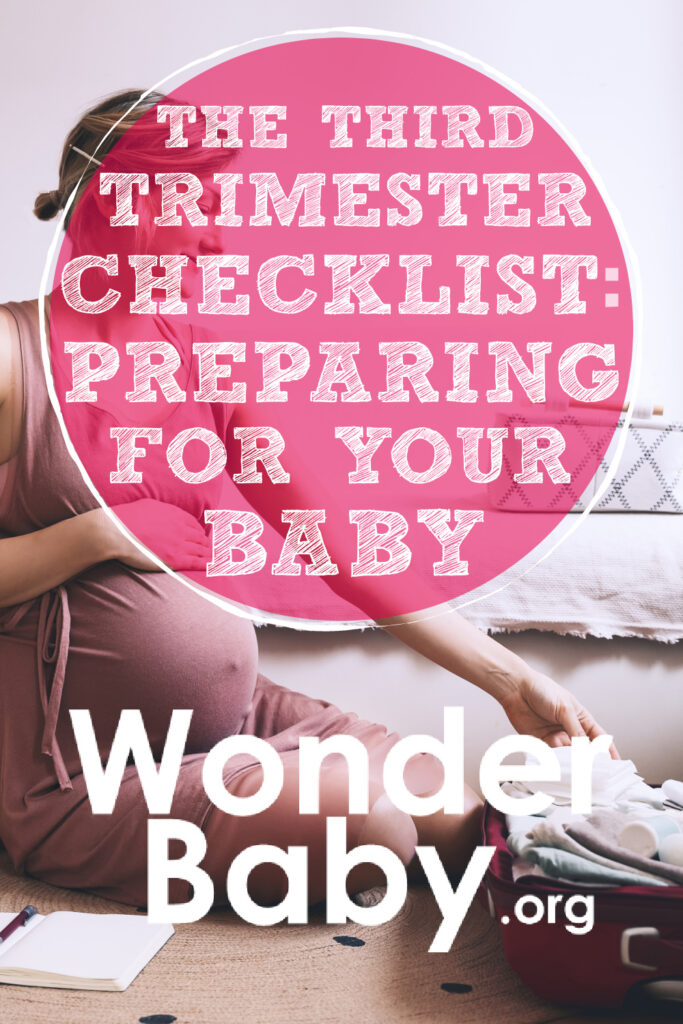
The information WonderBaby provides is not intended to be, and does not constitute, medical or other health advice or diagnosis and should not be used as such. Always consult with a qualified medical professional about your specific circumstances.
Related Posts
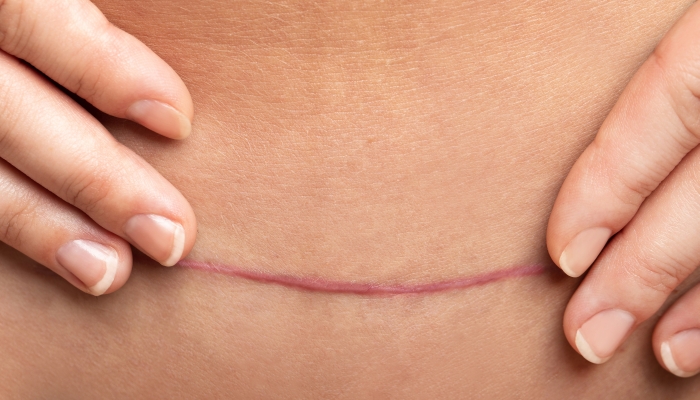
Pregnancy
How To Deal With an Ingrown Hair on a C-Section Scar
Ingrown hairs on a C-section scar can be treated using a warm compress or mild exfoliation. Infected ingrown hairs may require antibiotic treatment.

Pregnancy
What’s a Dye Stealer Pregnancy Test?
A dye stealer pregnancy test usually means that your hCG levels are very high, which is typically considered a good sign for pregnancy.

Pregnancy
Can Yelling Cause a Miscarriage?
Yelling alone can not cause a miscarriage. However, maternal stress can cause high blood pressure, preterm labor, and other health problems.